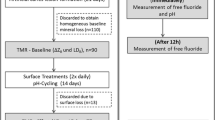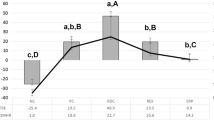Abstract
Objective
The aim of the present in vitro study was to evaluate the remineralizing effects of NaF, AmF, KF gels and NaF toothpaste in combination with a potentially demineralizing saliva substitute (Glandosane; pH = 5.1) being widely used in Germany.
Methods
In each of 120 dentin specimens, three artificial lesions were created. One lesion was covered for analysis of pre-demineralization (ΔZB). Treatments during pH cycling (3 × 1 h demineralization/day [pH = 5.0] and 3 × 3 h Glandosane/day; 12 h 100%humidity) were as follows: no treatment (NT), application (5 min,2×/day) of 12.500 ppm F− [pH = 6.04] (NaF-gel1), 12.500 ppm F− [pH = 7.34] (NaF-gel2), 12.500 ppm F− [pH = 5.82] (AmF-gel), 1450 ppm F− [pH = 7.35] (KF-gel), and 5000 ppm F− [pH = 8.14]; (NaF-TP) for 7 days (E1). Subsequently, from each specimen, one lesion was covered, while the remaining lesion was cycled for another 7 days (E2). Differences in integrated mineral loss (ΔΔZE1/ΔΔZE2) were calculated between values before and after pH cycling.
Results
Mean (95%CI) ΔZB was 3851 (3762;3939) vol% × μm. Except for NaF-gel2 and NaF-TP, specimens of all other groups further demineralized. Only NaF-gel2 induced a significant gain in mineral content (p ≤ 0.004; paired t test). Significant differences in the change of mineral loss were found between NT and all fluoride groups for both ΔΔZE1 and for ΔΔZE2 (p < 0.05, Bonferroni post hoc test). However, only NaF-gel2 and NaF-TP induced remineralization.
Conclusion
Under the in vitro conditions chosen, all fluoride agents could significantly hamper the adverse effects of a demineralizing saliva substitute.
Clinical significance
In combination with a demineralizing saliva substitute, slight mineral gain was only observed for neutral NaF-gel2 and 5000 ppm F− toothpaste.



Similar content being viewed by others
References
Ahadian H, Yassaei S, Bouzarjomehri F, Ghaffari Targhi M, Kheirollahi K (2017) Oral complications of the Oromaxillofacial area radiotherapy. Asian Pac J Cancer Prev 18:721–725. https://doi.org/10.22034/APJCP.2017.18.3.721
Atkinson JC, Grisius M, Massey W (2005) Salivary hypofunction and xerostomia: diagnosis and treatment. Dent Clin N Am 49:309–326. https://doi.org/10.1016/j.cden.2004.10.002
Almstahl A, Wikstrom M (2003) Electrolytes in stimulated whole saliva in individuals with hyposalivation of different origins. Arch Oral Biol 48:337–344
Tschoppe P, Wolgin M, Pischon N, Kielbassa AM (2010) Etiologic factors of hyposalivation and consequences for oral health. Quintessence Int 41:321–333
Vissink A, Jansma J, Spijkervet FK, Burlage FR, Coppes RP (2003) Oral sequelae of head and neck radiotherapy. Crit Rev Oral Biol Med 14:199–212
Kielbassa AM, Hinkelbein W, Hellwig E, Meyer-Luckel H (2006) Radiation-related damage to dentition. Lancet Oncol 7:326–335. https://doi.org/10.1016/S1470-2045(06)70658-1
Vissink A, Burlage FR, Spijkervet FK, Jansma J, Coppes RP (2003) Prevention and treatment of the consequences of head and neck radiotherapy. Crit Rev Oral Biol Med 14:213–225
Meyer-Lueckel H, Colfen H, Verch A, Tschoppe P (2010) Effects of carboxymethyl cellulose-based saliva substitutes with varying degrees of saturation with respect to calcium phosphates on artificial enamel lesions. Caries Res 44:127–134. https://doi.org/10.1159/000302901
Zimmermann JS, Niehoff P, Wilhelm R, Schneider R, Kovacs G, Kimmig B (1998) Prevention and therapy of acute radiation-related morbidity of the skin and mucosa. II, recommendations of the literature. Strahlenther Onkol 174:193–199
Momm F, Volegova-Neher NJ, Schulte-Monting J, Guttenberger R (2005) Different saliva substitutes for treatment of xerostomia following radiotherapy. A prospective crossover study. Strahlenther Onkol 181:231–236. https://doi.org/10.1007/s00066-005-1333-7
Zandim-Barcelos DL, Kielbassa AM, Sampaio JE, Tschoppe P (2015) Saliva substitutes in combination with high-fluoride gel on dentin remineralization. Clin Oral Investig 19:289–297. https://doi.org/10.1007/s00784-014-1264-8
Tschoppe P, Meyer-Lueckel H (2012) Effects of regular and highly fluoridated toothpastes in combination with saliva substitutes on artificial enamel caries lesions differing in mineral content. Arch Oral Biol 57:931–939. https://doi.org/10.1016/j.archoralbio.2012.02.010
Marinho VC, Worthington HV, Walsh T and Chong LY (2015) Fluoride gels for preventing dental caries in children and adolescents. Cochrane Database Syst Rev:CD002280. doi: https://doi.org/10.1002/14651858.CD002280.pub2
Nieuw Amerongen AV, Veerman EC (2003) Current therapies for xerostomia and salivary gland hypofunction associated with cancer therapies. Support Care Cancer 11:226–231. https://doi.org/10.1007/s00520-002-0409-5
Tschoppe P, Meyer-Lueckel H (2011) Mineral distribution of artificial dentinal caries lesions after treatment with fluoride agents in combination with saliva substitutes. Arch Oral Biol 56:775–784. https://doi.org/10.1016/j.archoralbio.2011.01.002
Tschoppe P, Siegel A, Meyer-Lueckel H (2010) Saliva substitutes in combination with highly concentrated fluorides and brushing: in vitro effects on enamel subsurface lesions. Caries Res 44:571–578. https://doi.org/10.1159/000321656
Zandim DL, Tschoppe P, Sampaio JE, Kielbassa AM (2011) Effect of saliva substitutes in combination with fluorides on remineralization of subsurface dentin lesions. Support Care Cancer 19:1143–1149. https://doi.org/10.1007/s00520-010-0924-8
Wierichs RJ, Zelck H, Doerfer CE, Appel P, Paris S, Esteves-Oliveira M, Meyer-Lueckel H (2017) Effects of dentifrices differing in fluoride compounds on artificial enamel caries lesions in vitro. Odontology 105:36–45. https://doi.org/10.1007/s10266-016-0233-x
Arends J and ten Bosch JJ (1992) Demineralization and remineralization evaluation techniques. J Dent Res 71 Spec No:924–8
Wierichs RJ, Lausch J, Meyer-Lueckel H, Esteves-Oliveira M (2016) Re- and demineralization characteristics of enamel depending on baseline mineral loss and lesion depth in situ. Caries Res 50:141–150. https://doi.org/10.1159/000444537
Wierichs RJ, Stausberg S, Lausch J, Meyer-Lueckel H, Esteves-Oliveira M (2018) Caries-preventive effect of NaF, NaF plus TCP, NaF plus CPP-ACP, and SDF varnishes on sound dentin and artificial dentin caries in vitro. Caries Res 52:199–211. https://doi.org/10.1159/000484483
Meyer-Lueckel H, Wierichs RJ, Gninka B, Heldmann P, Dorfer CE, Paris S (2015) The effect of various model parameters on enamel caries lesions in a dose-response model in situ. J Dent 43:1261–1267. https://doi.org/10.1016/j.jdent.2015.08.003
Esteves-Oliveira M, Santos NM, Meyer-Lueckel H, Wierichs RJ, Rodrigues JA (2017) Caries-preventive effect of anti-erosive and nano-hydroxyapatite-containing toothpastes in vitro. Clin Oral Investig 21:291–300. https://doi.org/10.1007/s00784-016-1789-0
Wierichs RJ, Westphal S, Lausch J, Meyer-Lueckel H, Esteves-Oliveira M (2018) Influence of highly concentrated fluoride dentifrices on remineralization characteristics of enamel in vitro. Clin Oral Investig 22:2325–2334. https://doi.org/10.1007/s00784-018-2333-1
Wierichs RJ, Kogel J, Lausch J, Esteves-Oliveira M, Meyer-Lueckel H (2017) Effects of self-assembling peptide P11-4, fluorides, and caries infiltration on artificial enamel caries lesions in vitro. Caries Res 51:451–459. https://doi.org/10.1159/000477215
ten Cate JM, Exterkate RA, Buijs MJ (2006) The relative efficacy of fluoride toothpastes assessed with pH cycling. Caries Res 40:136–141. https://doi.org/10.1159/000091060
ten Cate JM, Buijs MJ, Miller CC, Exterkate RA (2008) Elevated fluoride products enhance remineralization of advanced enamel lesions. J Dent Res 87:943–947. https://doi.org/10.1177/154405910808701019
Duckworth RM, Gao XJ (2006) Plaque as a reservoir for active ingredients. Monogr Oral Sci 19:132–149. https://doi.org/10.1159/000090589
Wegehaupt FJ, Attin T (2010) The role of fluoride and casein phosphopeptide/amorphous calcium phosphate in the prevention of erosive/abrasive wear in an in vitro model using hydrochloric acid. Caries Res 44:358–363. https://doi.org/10.1159/000316542
Yamazaki H, Margolis HC (2008) Enhanced enamel remineralization under acidic conditions in vitro. J Dent Res 87:569–574. https://doi.org/10.1177/154405910808700612
Brighenti FL, Delbem AC, Buzalaf MA, Oliveira FA, Ribeiro DB, Sassaki KT (2006) In vitro evaluation of acidified toothpastes with low fluoride content. Caries Res 40:239–244. https://doi.org/10.1159/000092232
Alves KM, Pessan JP, Brighenti FL, Franco KS, Oliveira FA, Buzalaf MA, Sassaki KT, Delbem AC (2007) In vitro evaluation of the effectiveness of acidic fluoride dentifrices. Caries Res 41:263–267. https://doi.org/10.1159/000101915
Backfolk K, Lagerge S, Rosenholm JB, Eklund D (2002) Aspects on the interaction between sodium carboxymethylcellulose and calcium carbonate and the relationship to specific site adsorption. J Colloid Interface Sci 248:5–12. https://doi.org/10.1006/jcis.2001.8195
Altenburger MJ, Schirrmeister JF, Wrbas KT, Klasser M, Hellwig E (2008) Fluoride uptake and remineralisation of enamel lesions after weekly application of differently concentrated fluoride gels. Caries Res 42:312–318. https://doi.org/10.1159/000148164
Lennon AM, Pfeffer M, Buchalla W, Becker K, Lennon S, Attin T (2006) Effect of a casein/calcium phosphate-containing tooth cream and fluoride on enamel erosion in vitro. Caries Res 40:154–157. https://doi.org/10.1159/000091063
Lagerweij MD, ten Cate JM (2006) Acid susceptibility at various depths of pH-cycled enamel and dentine specimens. Caries Res 40:33–37. https://doi.org/10.1159/000088903
Brown WE, Gregory TM, Chow LC (1977) Effects of fluoride on enamel solubility and cariostasis. Caries Res 11(Suppl 1):118–141
Lippert F, Juthani K (2015) Fluoride dose-response of human and bovine enamel artificial caries lesions under pH-cycling conditions. Clin Oral Investig 19:1947–1954. https://doi.org/10.1007/s00784-015-1436-1
Acknowledgments
This study was conducted as part of the doctoral thesis of M.K.
Funding
This study was funded by the authors and their institution. Products were not provided by the manufacturers.
Author information
Authors and Affiliations
Corresponding author
Ethics declarations
Conflict of interest
The authors declare that they have no conflicts of interests.
Ethical approval
This article does not contain any studies with human participants or animals performed by any of the authors.
Informed consent
For this type of study, formal consent is not required.
Rights and permissions
About this article
Cite this article
Walther, C., Kreibohm, M., Paris, S. et al. Effect of NaF, AmF, KF gels and NaF toothpaste combined with a saliva substitute on dentin lesions in vitro. Clin Oral Invest 23, 2489–2496 (2019). https://doi.org/10.1007/s00784-018-2687-4
Received:
Accepted:
Published:
Issue Date:
DOI: https://doi.org/10.1007/s00784-018-2687-4




